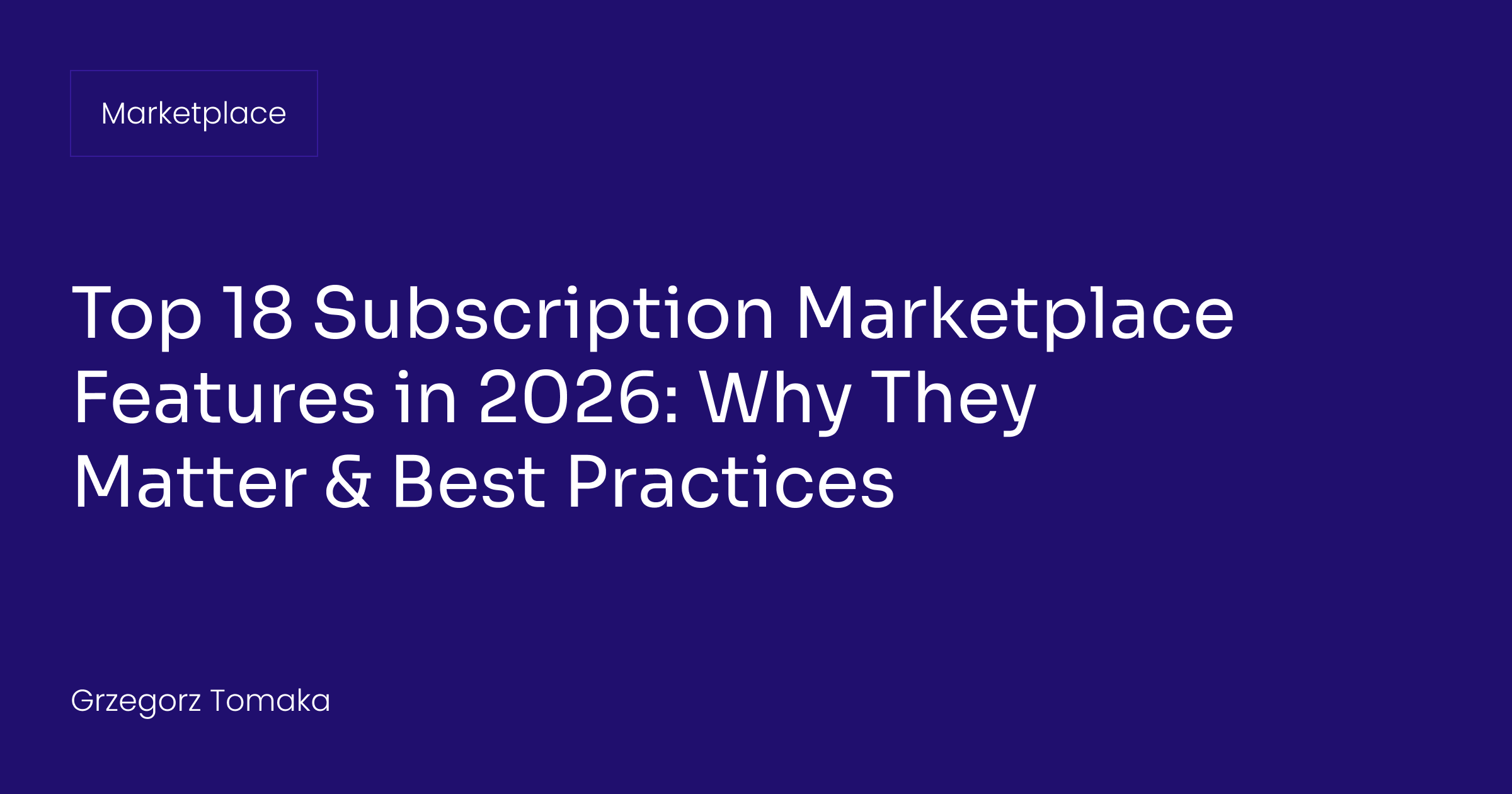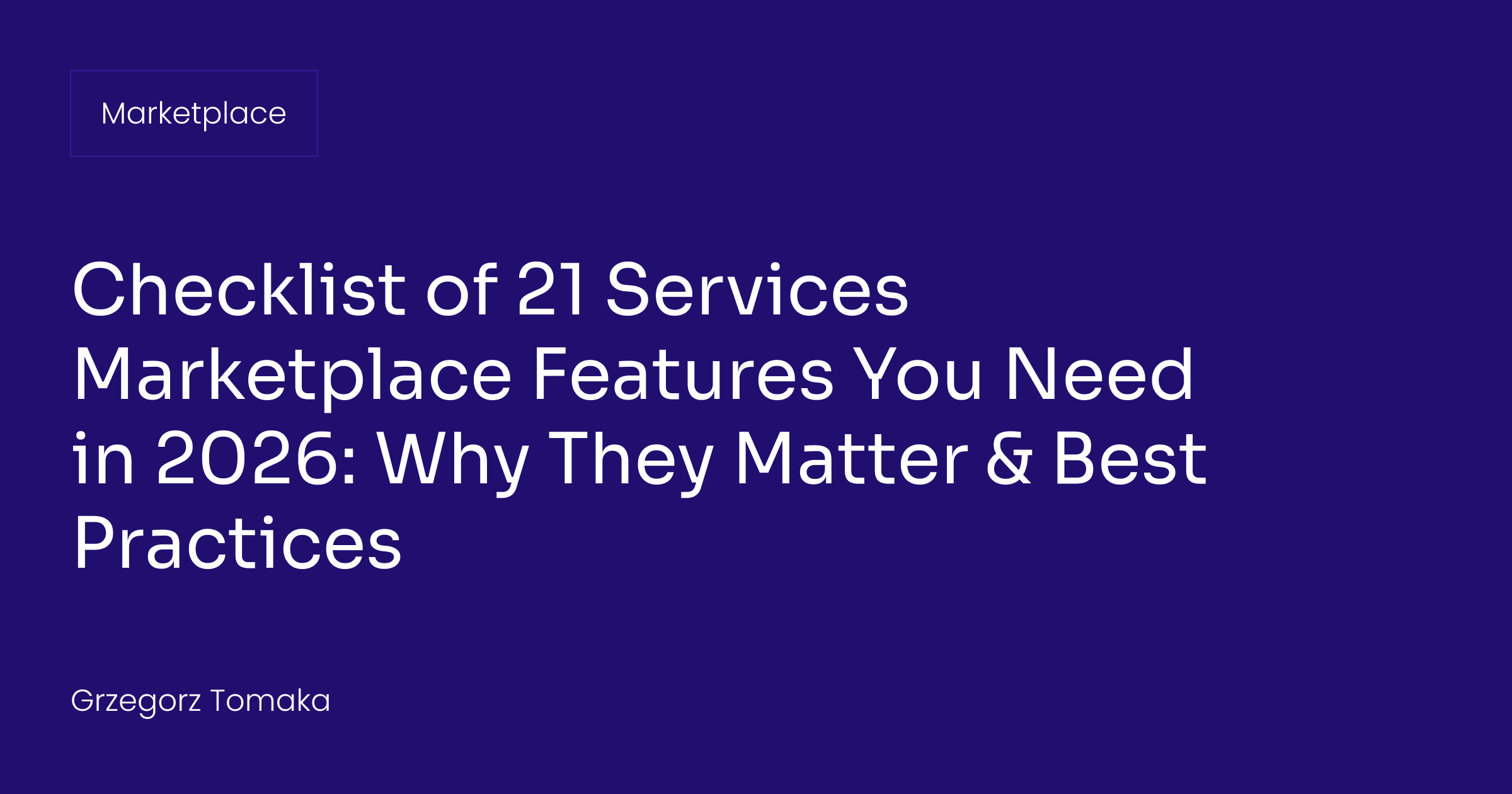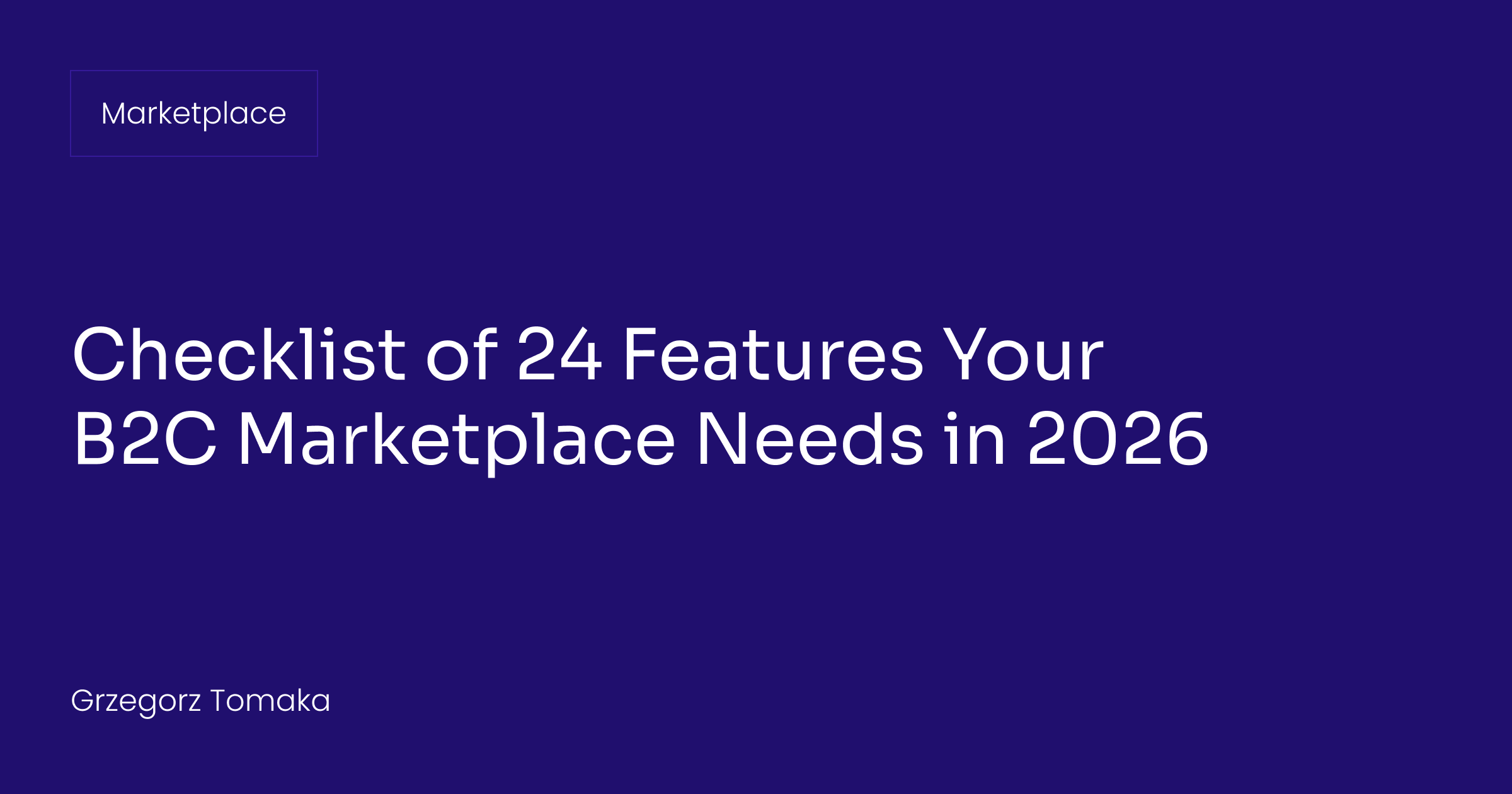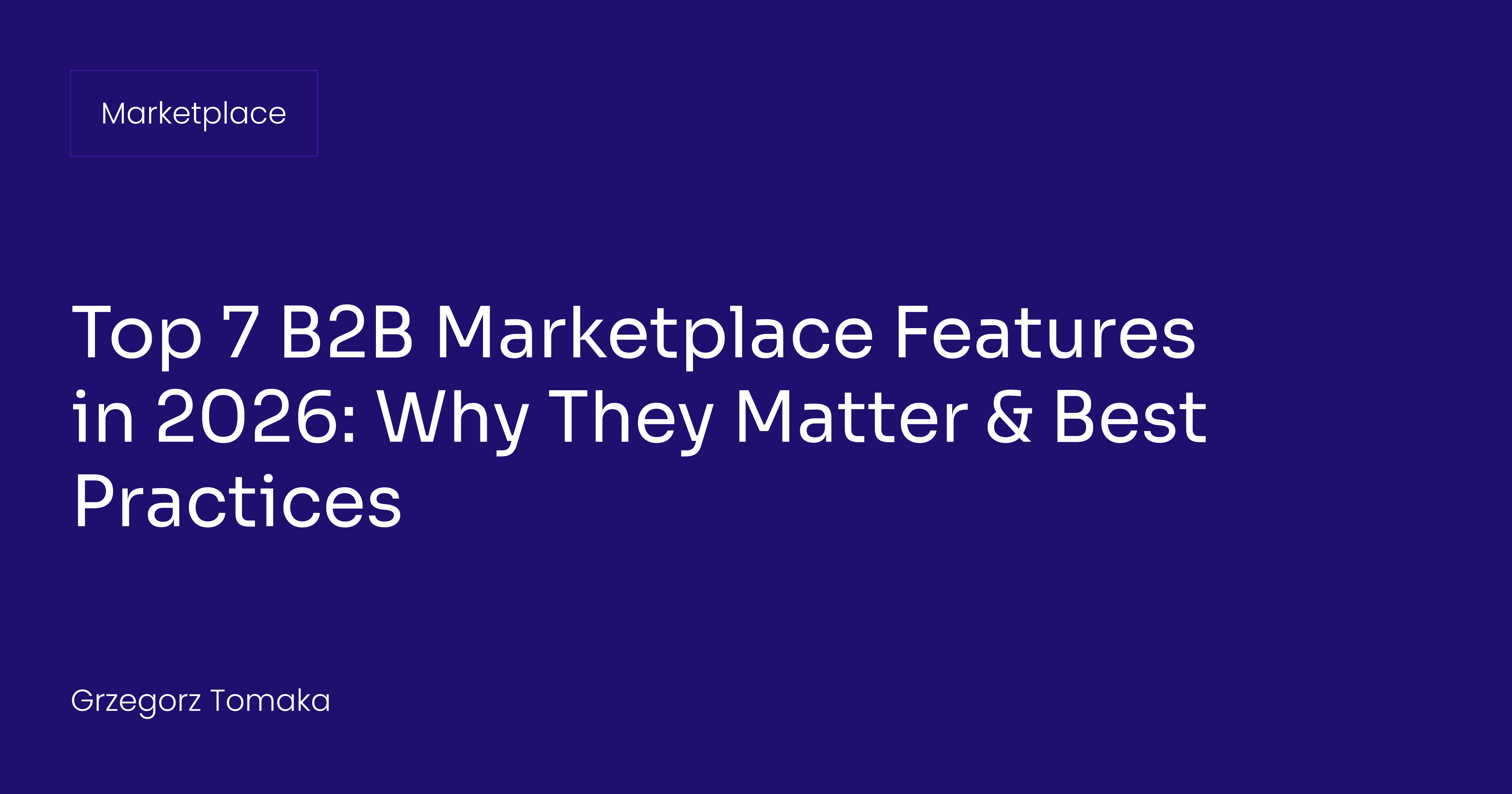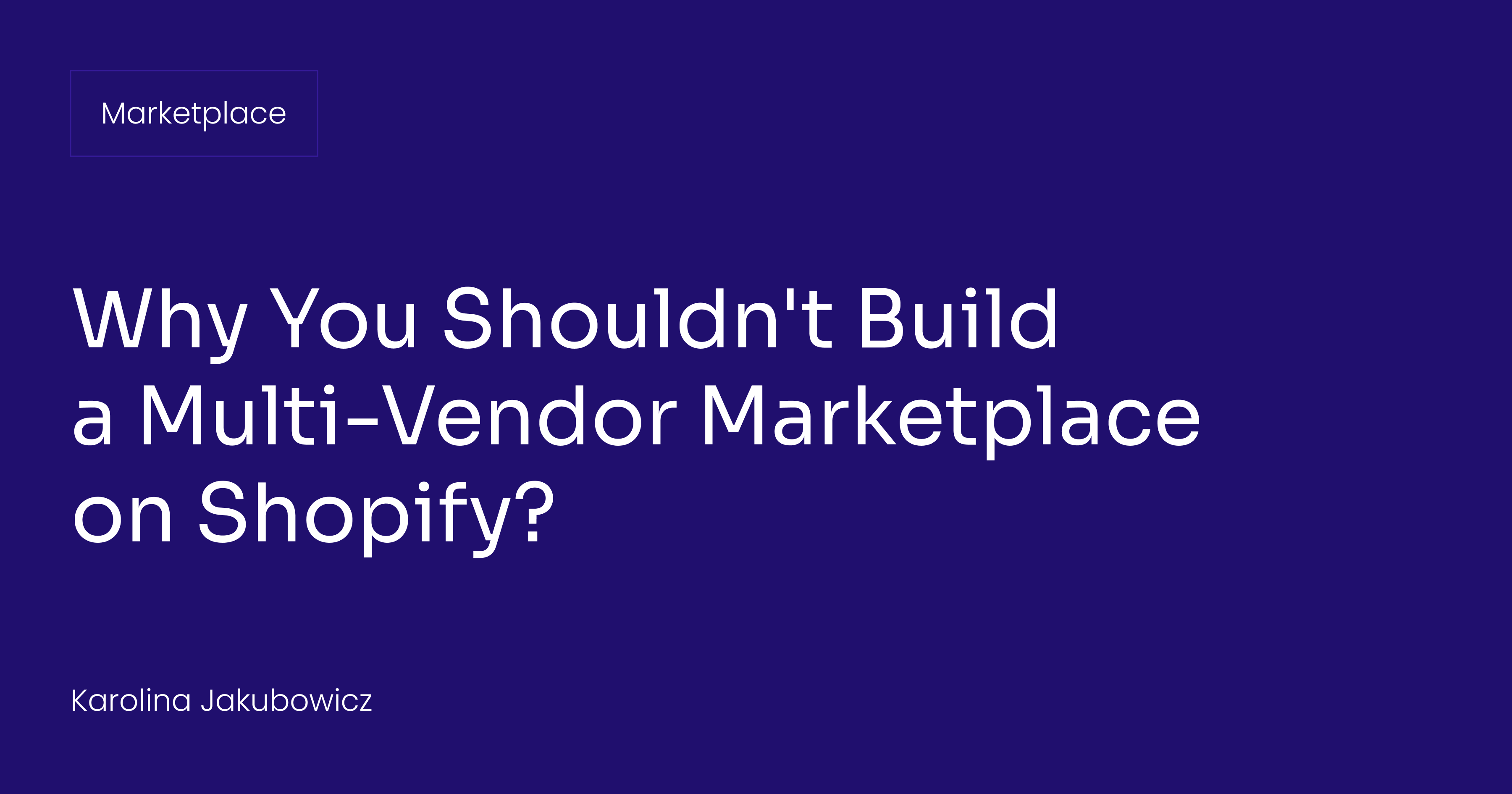Let’s talk about how we can build your commerce project — tailored to your business, powered by Rigby
From giants like Amazon to niche marketplace owners, marketplaces have revolutionized how consumers and businesses interact.
But today, businesses don't want to be limited to pre-made online marketplace development solutions.
As customers and vendors need grow and change, more companies are deciding on custom marketplace software development that is specifically tailored to their goals and the experiences they want to offer.
In this article, we’ll look at why more businesses are turning to custom marketplace development.
Custom solutions win when you need control and differentiation - but choosing the right base platform is crucial. We’ve prepared an eBook that analyses the most popular marketplace platforms on the market. Use this guide to compare architecture, features, TCO & more.
Check it out! - Top 11 Multi-Vendor Marketplace Platforms for eCommerce

What is a Custom Marketplace?
In a custom marketplace, multiple vendors can sell their products or services, but what makes it special is that everything can be customized.
Whether you need specific payment gateways, advanced search filters, or special tools for managing vendors, a custom development lets you add or change features as your business grows.
Building a custom marketplace also means having more control over important things like data security and how your platform integrates with other services.
This type of marketplace allows you to create a unique shopping experience that adapts to your business model, instead of trying to fit your business into a pre-built solution.
Custom Marketplace vs. Off-the-shelf solutions

When choosing between a custom development and an off-the-shelf solution, it’s important to know how they differ.
Off-the-shelf platforms are pre-built, ready-made solutions that can be set up quickly. At first glance, they may seem like the easiest option because they allow you to get started without much development work. However, these platforms are designed to meet the general needs of many businesses, which often means they come with limitations.
On the other hand, custom marketplace development allows you to create a platform designed exactly for your business model. This level of control makes it easier to adjust your marketplace to changing market trends, customer needs, or business goals.
Customization level
One of the biggest differences between custom and off-the-shelf solutions is the level of customization.
Off-the-shelf platforms are built for a broad range of users, which means they offer limited options for making the platform your own. While you might be able to change basic elements like colors or logos, and add a few features, beyond that, you’re often stuck with the roadmap and the features that the vendor offers today. Although there may be promises of new updates or features in the future, these plans are outside of your control, leaving you waiting for developments that may not align with your business timeline.
In contrast, custom marketplace development allows you to fully tailor every aspect of the platform to your needs. You can design the user interface, add advanced features, integrate your own payment gateways, or create custom tools for vendors. This level of customization allows you to create a unique marketplace experience that fits your brand perfectly and meets the specific demands of your business.
Long-term costs
While off-the-shelf solutions might seem cheaper at first, the long-term costs can quickly pile up. You often end up paying extra for add-ons, plugins, or third-party services just to get the platform to work the way you need it to. If you need special features that aren't included, you might have to hire developers to make custom modifications, which can be expensive and time-consuming.
Custom marketplace development requires a larger initial investment, but it can save you money in the long run. Once the platform is built, you won’t need to pay for additional features or continuous upgrades. Since the platform is designed specifically for your business, it works exactly as you need it to from the start. Plus, you own and control the entire platform, so you have the freedom to make updates and improvements as needed, without relying on expensive third-party services or external vendors.
Think of it like a tailor-made suit - you pay only for what you need now and in the future, without wasting money on unnecessary features, which is common in off-the-shelf solutions. Research even shows that 80% of software features are rarely or never used (Source), highlighting the inefficiency of paying for functionalities you won’t benefit from. With a custom solution, every feature is built with your business in mind, ensuring you invest only in what truly drives value.
Multi-vendor functionality and scalability
Off-the-shelf platforms can struggle to keep up as your marketplace grows. They may limit the number of vendors you can support or make it difficult to manage a large number of products.
Custom marketplaces are designed to handle an increasing number of vendors, products, and customers without sacrificing performance. Whether you’re managing a few vendors or hundreds, it will give you the flexibility to scale without hitting technical limitations.
In short, while off-the-shelf solutions offer a quick and easy start, they come with limitations that can restrict your growth and cost you more in the long run. Custom marketplace development, though requiring more upfront investment, adapts to your business, while an off-the-shelf solution forces your business to adapt to the platform.
Benefits of building a Custom Marketplace

Now that we understand the differences between custom marketplace development and ready marketplace platform, let's summarize the major benefits of choosing a custom solution.
Flexibility and scalability in marketplace development
A custom development offers unmatched flexibility. You can design the platform exactly how you need it, with the specific features and functionalities that suit your business.
As your online marketplace grows, the platform can easily scale to support more vendors, products, and customers without running into limitations. This scalability ensures that your marketplace can handle future growth without needing expensive upgrades or a complete rebuild.
Control over features and experience
With a custom marketplace, you have full control over how everything works. You’re not limited by pre-made designs or feature sets.
Instead, you can create a user experience, whether it’s the checkout process, vendor tools, or customer support features, that aligns perfectly with your brand and business goals.
Integration with third-party services
Custom-built platforms make it easy to integrate with the third-party services your business relies on. Whether you need payment gateways, ERP systems, or other tools, a marketplace allows you to connect these services seamlessly.
This means you can offer more payment options, streamline operations, and ensure that your marketplace works smoothly with the systems you already have in place.
Data security and ownership
With a custom development, you have greater control over how customer and vendor data is handled. This means you can implement higher security standards, manage who has access to the data, and ensure that sensitive information is protected.
Additionally, you own the platform, which means you’re not relying on a third-party provider to keep your marketplace secure. This level of control reduces risks and increases the trust your users have in your platform.
Challenges in Custom Marketplace development

While building a your own marketplace offers many advantages, it’s important to recognize that it also comes with its own set of challenges. Here are some of them.
Common pitfalls in the marketplace development process
One of the biggest challenges in the online marketplace development process is underestimating the time and resources needed to build a custom platform.
Many businesses start with a broad vision but may run into roadblocks when trying to implement complex features or manage multiple vendors.
Delays can happen if the scope of the project isn’t clearly defined from the start, leading to longer development times and higher costs. It's essential to have a clear plan and prioritize key features of your project.
Technical expertise
Building marketplaces require a high level of technical expertise. This means you need a skilled development team with experience in creating marketplace platforms. Hiring the right experts is important to ensure that the marketplace is built correctly and can handle the demands of your business.
How to ensure quick market entry
One way to overcome some of the challenges of custom development is by starting with a Minimum Viable Product (MVP).
An MVP is a simpler version of your marketplace that includes only the most important features needed to launch. By focusing on essential elements like vendor onboarding, product listings, and secure payment gateways, you can test the platform and gather feedback from real users.
This allows you to enter the market quickly and start generating revenue, while still leaving room to add more advanced features later.
Features of a successful Custom Marketplace

To create a successful online marketplace, it’s important to focus on meeting the needs of your business, making it easy for vendors to manage their stores, and customers to find what they need quickly and securely.
If you want to compare feature requirements across marketplace models, see our guides for B2C and B2B marketplace features.
Let's explore these features.
Search filters and user-friendly interfaces
One of the most important features in any marketplace is the ability for customers to easily find what they’re looking for.
Advanced search filters allow users to sort and filter products by categories, price, location, ratings, and more. This makes the shopping experience smooth and enjoyable.
A user-friendly interface should be easy to navigate, visually appealing, and responsive on both desktop and mobile devices. When your marketplace is simple to use, customers are more likely to stay longer and complete their purchases.
Secure payment gateways and transactions
A secure payment gateway is important for building trust with both customers and vendors. Offering multiple payment options, such as credit cards, PayPal, or regional payment methods, helps make transactions smooth and convenient.
The checkout process, with clear steps and easy-to-understand payment information, reduces cart abandonment and ensures a positive buying experience.
Prioritizing secure payment gateways also protects customer data and ensures safe transactions.
Multi-vendor management and vendor dashboards
The marketplace often involves many sellers, so having a strong multi-vendor management system is key. This feature allows you to easily onboard new vendors, track their sales, and manage their listings.
Vendors should also have access to intuitive vendor dashboards where they can update products, track orders, and view sales performance. A user-friendly vendor dashboard helps vendors manage their operations efficiently, ensuring they stay active and engaged on your platform.
Customizable business models
One of the benefits of a custom development is the ability to choose or combine different business models.
Depending on your goals, you might want to implement a subscription model, where vendors pay a monthly fee to use your online marketplace platform, a commission model, where you take a percentage of each sale, or a listing fee model, where vendors pay a fee to list their products.
Customization allows you to pick the model that best fits your business and adjust it over time as your marketplace grows.
Mercur - the right platform for your Custom Marketplace

Selecting the right technology is a critical part of marketplace development. Your choice will depend on several factors, such as the scalability of the platform, integration with third-party tools, and your development team’s expertise.
We recommend a marketplace solution created by us - Mercur, an open-source marketplace platform built on top of modern Medusa. It enhances Medusa’s capabilities by offering pre-built components and tools designed specifically for marketplace functionalities, enabling businesses to implement custom features more effectively.
With scalability and flexibility at its core, Mercur enables businesses to create fully customizable marketplaces quickly, allowing users to launch a new marketplace in just about five minutes, making it an ideal starting point for anyone building their own platform.
And if you're looking for a comparison of multi vendor marketplaces platforms based on many factors, check out our article - 11 Top-Rated Multi-Vendor Marketplace Platforms for eCommerce.
The Custom Marketplace development process

Building a custom solution requires careful planning and a clear process to ensure that the platform meets your business needs and serves your customers and vendors effectively. Here are the typical steps in the marketplace development strategy:
Planning and research
The first step is gathering information and conducting thorough research. This involves evaluating your current platform’s limitations, understanding what functionalities you need, and comparing them with what competitors are offering.
In this stage, it's important to research technology options, such as frameworks like Medusa, which is highly adaptable and allows for full customization.
At this stage, you may also define the features you want to prioritize, such as vendor management, secure payment gateways, or custom product listings.
Designing
Once the plan is in place, the next step is to focus on design. This means creating wireframes of how the marketplace project will look and function.
It’s critical to design user-friendly interfaces for both customers and vendors. The user experience (UX) should prioritize easy navigation, advanced search filters, and secure checkout flows.
On the vendor side, consider intuitive dashboards that allow vendors to easily manage their products, orders, and payouts.
Development
You can now move on to the development phase. This is where your team starts coding the platform and building the essential functionalities. Depending on the technology stack you've chosen, you’ll begin by implementing core features such as:
- Vendor onboarding: A smooth process for new vendors to register, list products, and manage orders.
- Payment gateways: Integrating secure, flexible payment solutions that accommodate multiple payment options.
- Search and filtering functionalities: Building advanced search filters to enhance product discovery for customers.
Testing
After the core development is complete, the platform enters the testing phase. Testing ensures that all features work as intended and that there are no bugs or performance issues. Key areas to focus on include:
- Payment processing: Test all payment gateways and ensure they are secure and functional for both customers and vendors.
- Multi-vendor management: Test the onboarding process, vendor dashboards, and the ability to manage products and orders.
- Performance: Ensure the platform can handle high traffic, especially if you have multiple vendors and a large product catalog. Load testing is important to verify the platform’s scalability. Testing is also an opportunity to gather feedback from key users, such as a small group of vendors or customers, before the full launch.
Launch the MVP
Once testing is complete and the platform is stable, it’s time to launch the Minimum Viable Product (MVP). The MVP version of your online marketplace will include the essential features needed to operate but will leave room for future improvements based on user feedback.
By launching the MVP, you can enter the market quickly and begin gathering real-world data on how the platform performs. This allows you to fine-tune features, fix any remaining bugs, and plan for the implementation of more advanced features in later updates.
Launching an MVP also helps in managing the scope of the project, allowing you to introduce new features incrementally without overwhelming your users or your development team.
How Custom Marketplace development transformed Natuja’s business

In the case of our client Natuja, the DACH marketplace for natural products, transitioning from a pre-built Sharetribe platform to a custom-built marketplace on Mercur, and Medusa brought positive changes for the business.
Before the migration, Natuja faced limitations that hindered their growth, including limited flexibility for customizations and increasing costs due to the "pay as you grow" model of Sharetribe. These challenges made it difficult to scale and address the needs of vendors and customers.
By moving to a custom marketplace solution, Natuja was able to overcome these hurdles. The custom platform provided greater scalability, allowing them to handle over 150 vendors and around 1,000 products with ease.
Additionally, Natuja gained the ability to implement custom features, such as region-based shipping costs and a more flexible vendor commission system, which were crucial for their operations.
This new solution also improved the user experience with intelligent search filters and faster transactions through enhanced payment systems.
As a result, Natuja saw immediate benefits, including faster platform performance, positive feedback from both customers and vendors, and a solid foundation for future growth.
Conclusion
Building a custom marketplace is a smart move for businesses looking to take full control of their platforms. Unlike off-the-shelf solutions, custom development allows you to design every aspect of the marketplace to suit your vision.
With our expertise in online multi vendor marketplace development, we can guide you through every step of the process - from defining your vision to building a scalable platform.
Whether you're starting from scratch or need help enhancing an existing platform, our team is ready to bring your ideas to life.

